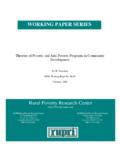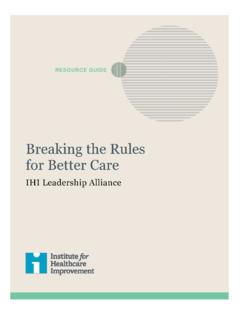Transcription of Access to Rural Health Care – A Literature Review …
1 Access to Rural Health care A Literature Review and New synthesis Prepared by the RUPRI Health Panel Principal Author A. Clinton MacKinney, MD, MS Contributing Authors Andrew F. Coburn, PhD Jennifer P. Lundblad, PhD, MBA Timothy D. McBride, PhD Keith J. Mueller, PhD Sidney D. Watson, JD August 2014 Acknowledgements This report was supported by the Rural Policy Research Institute through a cooperative agreement with the Federal Office of Rural Health Policy, Health Resources and Services Administration, US Department of Health and Human Services, Grant U18RH03719. Support was also provided by the Leona M. and Harry B. Helmsley Charitable Trust, Grant No. 2012PG-RHC030. We wish to thank Emily Schlicting (an Office of Rural Health Policy Truman Scholar during initial research) for her contributions to this document.
2 We also thank Susan Nardie for her assistance in editing and formatting the document. Contents Abstract ..1 Introduction ..2 Access Importance ..2 Rural Applicability ..4 Access Descriptions ..5 Definitions .. 5 Measures .. 6 Barriers .. 7 Frameworks .. 8 Current Public Policy .. 11 Access synthesis for Policy Analysis .. 13 People .. 13 Place .. 14 Provider .. 14 Payment .. 14 Summary .. 16 The Future .. 17 Actionable Access Measurement .. 17 Conclusion .. 18 References .. 19 Abstract Purpose In the 2011 paper, The Rural High Performance Health care System of the Future, the RUPRI Health Panel included accessibility in its five principles of a high performance Rural Health system: affordability, accessibility, community Health , high quality care , and patient centeredness (Mueller et al.)
3 2011). To design and develop a high performance Rural Health system, researchers, policy makers, providers, and the public need to understand clearly the concept of Access to Health care . This paper reviews important Access definitions and frameworks from the Literature . The Review serves as a concept map to create a unique synthesis of perspectives that may be used by researchers and policy makers to design or clarify Access to Health care policies. Recommendation A synthesis of frameworks that includes four dimensions of Access (people, place, provider, payment) serves as a basis for Health care policy assessment. Among the four dimensions, Access is only as strong as its weakest link. Therefore, an Access synthesis must recognize the interconnections and interactions between each dimension.
4 Changes to one affect another or all three others. The synthesis recognizes that Access , in its multiple dimensions, changes over time. Thus, to ensure best outcomes, policy makers should address all four Health care Access dimensions during policy design, deliberation, and implementation. Implications When designing or evaluating Health care policy, policy makers should specifically consider each of the four Access dimensions: people, place, provider, and payment. How does the policy affect each of these dimensions, and how does the policy change the dynamic between the dimensions? As the current Health care delivery system begins to respond to increasing demands for quality improvement and cost control, Access to Health care services is at risk.
5 Health services researchers should refocus on understanding Health care Access and designing Access measures that help key stakeholders evaluate Rural Health care policies. 1 Introduction In its 2011 paper, The Rural High Performance Health care System of the Future, the RUPRI Health Panel included accessibility in its five principles of a high performance Rural Health system: affordability, accessibility, community Health , high quality care , and patient centeredness (Mueller et al. 2011). Mueller and MacKinney (2006) specifically suggested that all Rural communities should have local Access to public Health services, emergency medical services, and primary care . As investments to improve Rural Health Access have become more significant, and as demographic and economic changes reshape settlement patterns across the United States, policy makers have used discrete measures ( , Health care service utilization or Access to a regular source of care ) to assess Access and identify areas for special policy consideration.
6 When research has shown Rural and urban Health care service utilization to be similar, and Rural and urban populations to be similarly satisfied with Access , some have questioned the need for special policies to ensure Rural Health care Access (MedPAC 2012). Others have argued that assessing Access by simply measuring care affordability or provider availability is neither adequate nor appropriate to understand Health care Access (Khan and Bhardwaj 1994). In the context of the RUPRI Health Panel s vision of a high performance Rural Health care system of the future, it is essential to understand more clearly the concept of Access and, most importantly, to understand how to assess Rural Health system performance and policy proposals regarding Access to Health care services.
7 This paper will describe why Access to Health care services is important to the national experience and will explore the rich academic Literature regarding Access to Health care services. The paper will then propose a new synthesis of Access characteristics suitable for ensuring that new policies designed to improve Access consider the complex concept of Access in its entirety. Lastly, the paper will outline how current and future Health care system changes will influence societal consideration of Access . Access Importance Americans ask, Will I be able to get the care I need if I become seriously ill? (Institute of Medicine [IOM] 1993, 31) Questions regarding Health care affordability and Health care provider availability often weigh heavily.
8 For Rural Americans, the issue of Access to Health care services is particularly acute. By definition, Rural places have lower population densities, resulting in Rural residents having to travel greater distances to Access Health care and in Health care providers being less proximate to the people they serve. Health care system redesign policies should include accessibility as a fundamental focus, preserving Access to Health care when populations are served well and improving Access when they are not. Health care is a uniquely vital service in the human experience at times literally life and death. In Securing Access to Health care , a report on the ethical implications of differences in availability of Health services, the introduction states: 2 The prevention of death and disability, the relief of pain and suffering, the restoration of functioning: these are the aims of Health care .
9 Beyond its tangible benefits, Health care touches on countless important and in some ways mysterious aspects of personal life that invest it with significant value as a thing in itself (President s Commission 1983). The President s Commission describes Health care as a social obligation. Daniels goes further to describe the central moral importance of Health care for the purposes of justice. Effective Health care services protect an individual s normal functioning, preserve an individual s ability to participate fully in society, and protect a fair share of the opportunities most people would choose. He notes that Health care as a right derives from societal obligations to protect equality of opportunity (Daniels 1985).
10 Health care is often considered a merit good a commodity that an individual or society should have based on need, rather than on the ability or the willingness to pay (Johnson 2005). When Health care is considered a merit good, equitable Access to Health care without excessive burden becomes an ethical obligation of society (IOM 1993). Thus, Health care is both a social good and a human right (Gulliford et al. 2002). Access to Health care services means timely use of personal Health services to achieve the best Health outcomes. Furthermore, Access to Health care influences overall physical, social, and mental Health status; prevention of disease and disability; detection and treatment of Health conditions; quality of life; preventable death; and life expectancy (Healthy People 2012).




